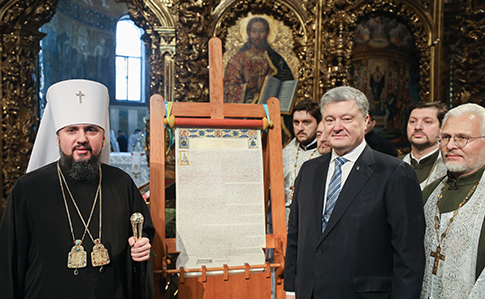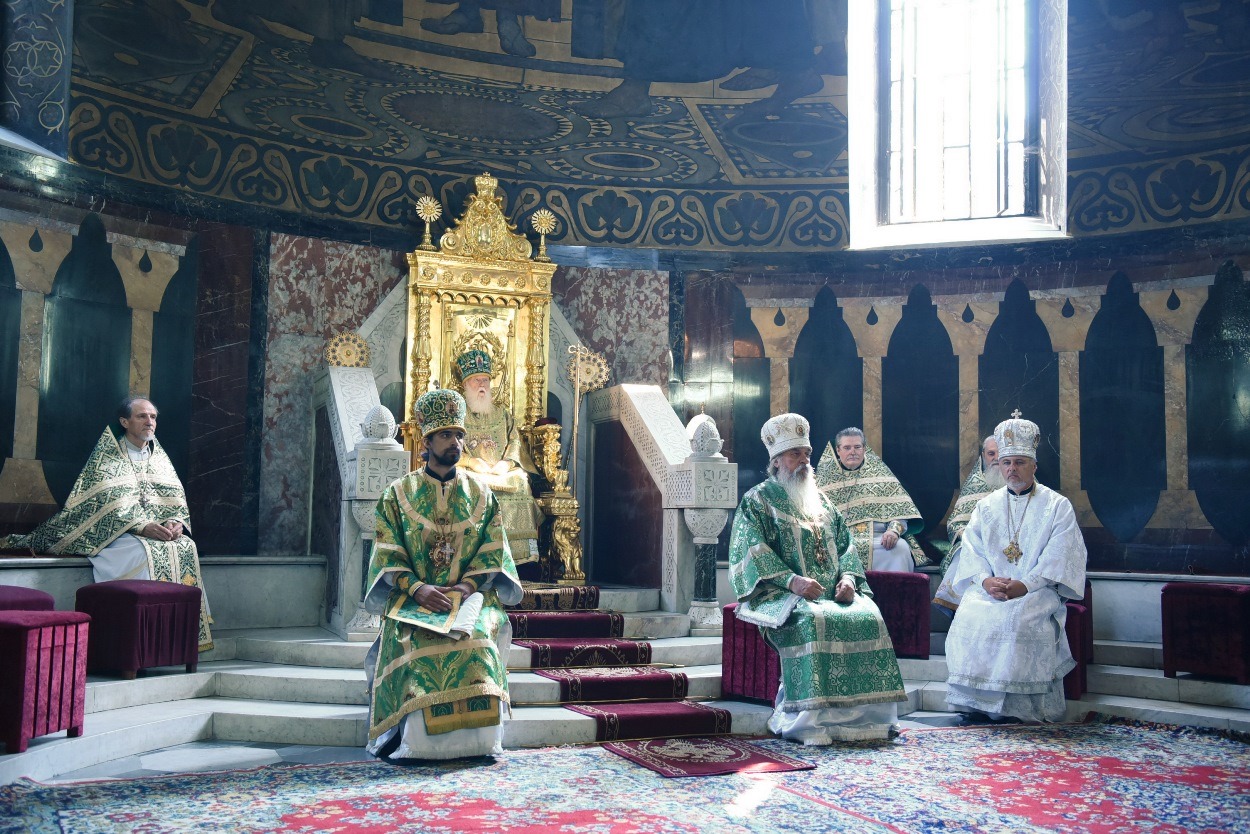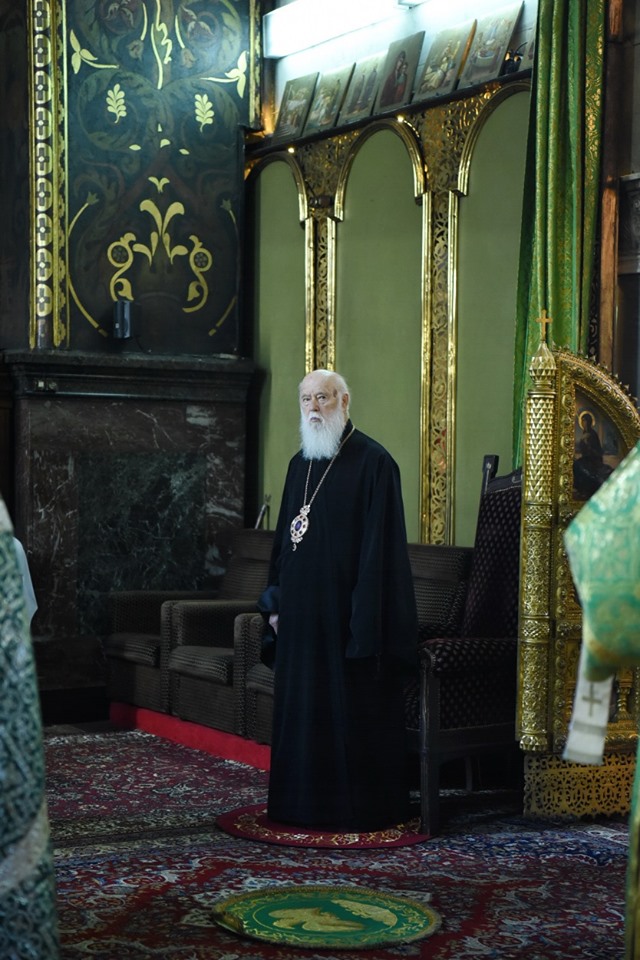When on 6 January 2019, the Orthodox Church of Ukraine (OCU) finally received the Tomos of autocephaly from Ecumenical Patriarch Bartholomew, securing a legitimate independence from Moscow, it faced many challenges. Internal unity was a major one, as the new church molded together representatives of three hitherto separate churches. International recognition was another one, as the powerful Moscow Patriarchate was predicted to use all its might to fight against this weakening of its ideological grip over Ukraine. Internal church reform and coming up to date was a third.
But the real problems came from where nobody expected. The person who was seen as the main architect of the OCU’s independence, Honorary Patriarch Filaret, has now rebelled against the newborn OCU and after a period of attempting to lure bishops to his side, gone into schism with it, rebuking the Tomos that the OCU had so painstakingly sought out from Constantinople and announcing the restoration of his old structure, the Ukrainian Orthodox Church of the Kyiv Patriarchate (UOC KP).
Filaret, a 90-year old bishop, is a polarizing figure both inside and outside Ukraine. For the faithful of the Kyiv Patriarchate, he is the person who contributed the most to the Ukrainian Orthodox Church’s centuries-long quest for independence. For the Ukrainian Orthodox Church in union with Moscow, he is a pledge-breaking schismatic. For many Orthodox worldwide, he is the reason to refrain from recognizing the new UOC.
So, who is Filaret and how serious is the crisis he caused in the OCU?
Honeymoon period over
Following the Unification Council on 15 December 2018, in which representatives of the hitherto existing Ukrainian Orthodox Church of the Kyiv Patriarchate (UOC KP), Ukrainian Autocephalous Orthodox Church (UAOC), and Ukrainian Orthodox Church of the Moscow Patriarchate (UOC MP) joined to create the OCU. The Council, insistently prodded forward by then President Poroshenko who later made the attainment of Church independence a cornerstone of his ultimately unsuccessful election campaign, resulted in the newly-formed church structure being based mostly on the UOC KP. From its schismatic formation by Filaret in 1992, it had grown to boast the support of the majority of Orthodox Ukrainians thanks to its pro-Ukrainian position amid Russian aggression. The UOC KP and UAOC dissolved their structures to create the OCU, while only two bishops of the UOC MP participated in the Council.
Thus, Ukraine found itself in a brand new church situation, with two legitimate, recognized Orthodox Churches, the newly-created OCU and UOC MP in union with Moscow, competing for the hearts of Ukrainians on its territory, as opposed to the previous decades when the UOC KP and UAOC were considered schismatic by the world Orthodox community.
After an initial period of exhilaration and optimism, epitomized by Poroshenko’s nationwide pre-election Tomos-boasting tour, the church topic left news headlines, but problems remained.

Although hopes for the UOC MP parishes joining the OCU were initially high, at publication date, the transition rate had trickled down and only 537 had joined the OCU’s approximately 7,000 parishes - a fraction of the UOC MP’s 11,000. Moreover, the transition process, although facilitated by a law intending to make it as peaceful as possible, was marred by allegations of violence by both sides, and the UOC MP’s accusations that local authorities were abusing their resources in favor of the new OCU.
At present, the OCU has been recognized only by one other Orthodox Church from the total 16 - the Ecumenical Patriarchate which granted it autocephaly in the first place, claiming to have rights to this territory which the Moscow Church had illegally usurped. This move by Patriarch Bartholomew of Constantinople, who carries the honorary title of “first among equals” among the other primates of Orthodox Churches, precipitated what observers called the “largest schism in the Church since 1054,” with the powerful Moscow Patriarchate breaking off communion with Constantinople. Ukrainian church analysts contend that Moscow is now leading an international campaign to prevent the recognition of the OCU by other Churches, as well as a campaign to discredit the OCU within Ukraine.
The interaction of the bishops of the church previously from three different jurisdictions has not been without friction. So much that, as Euromaidan Press’ sources told, any rapid modernization anticipated by a part of church civil society was unrealistic: maintaining unity is the number one goal at present. This unity was furthermore endangered by the untransparent election process at the Unification Council. Filaret finally conceded to holding the Council by Constantinople’s rules and removing his claims to primacy over the OCU in exchange for the election of his protege, Epifaniy, church sources say. Few expected any other scenario than Filaret continuing to govern the new Church structure through Epifaniy.
But Metropolitan Epifaniy turned out to have a mind of his own. And the elderly bishop dubbed as the “creator” of Ukraine’s independent church went berserk.
A lust for power

The first signs of Filaret’s resentment appeared in May when it was rumored that he would convene a council changing the Statute of the Orthodox Church to transform it into a duumvirate where he would rule besides Metropolitan Epifaniy.
This was preceded by interviews in which Filaret told that he was dissatisfied with the status quo of the OCU. It was, he contended, not fully independent: the Council was convened by the “Greeks” (meaning the Ecumenical Patriarchate), its democratic Statute was written by the “Greeks,” the OCU was granted not the status of a Patriarchate but merely a Metropoly (which, however, does not detract from its autonomy), and the UOC KP’s few overseas parishes were to go under the jurisdiction of the Ecumenical Patriarchate, not the OCU.
In another, he said that, in fact, the Ukrainian Orthodox Church of the Kyiv Patriarchate still existed, pointing to the title of “Honorary Patriarch” that the Synod of the OCU had allowed him to keep as an act of mercy. “If there is a Patriarch, there must be a Patriarchate,” the white-haired Gandalf-looking elder persuaded journalists, complaining that his protege does not communicate with him and never asks advice on managing the Church.
In another interview, Filaret said Poroshenko had promised him that the OCU would, actually, be governed as a duumvirate, with Epifaniy for external representation and Filaret deciding on internal issues.
Euromaidan Press’ church sources say that there indeed may have been such a promise, which could have been crucial for Filaret agreeing to not sabotage the Unification Council and creation of the OCU in the first place.
Did Metropolitan Epifaniy indeed turn his back on his teacher, revered for his perseverance to build up the structure of the UOC KP after going into schism with Moscow? Not from the outset, it appears. But the demands of Filaret to violate agreements with the “Greeks” became too persistent, and at a certain moment a choice was to be made: either stay on course for integration into the world family of Orthodox Churches or follow the instructions of Filaret. Epifaniy chose the former. The old man wanted to regain absolute power over the Church, as he had had for many decades. Nothing else would suffice, said sources inside the OCU.
Filaret had great influence over the bishops of the UOC KP, which was built up by years of authoritarian rule within a structure with a goal of surviving in a hostile environment. As well, he managed to keep control over the UOC KP’s coffers, leaving the OCU at financial ground zero. Some religious analysts began to fear that Filaret’s plan of a power grab could work. But when the time came, Filaret’s intentions were supported by only three bishops. All of them were from tiny dioceses in Russia. It was with two of them that on 20 June Filaret held a scarcely attended “Local Council of the UOC KP” which decreed that the UOC KP never ceased existing and laid claims to virtually all of the property of the OCU, as well as to the overseas parishes of the UOC KP which under the conditions of the Tomos should go under Constantinople.

The "Council" was immediately followed by the ordination of two more bishops, all performed in the St. Volodymyr’s Cathedral, in line with Filaret’s plan to raise their number to 12, as required by the Statute of the UOC KP.
The ordination of two bishops by Filaret. Photos: UOC KP’s fb page
These events elicited a response: the Synod of the OCU removed two schismatic bishops from their duties and issued a ban on the priestly duties of those who were ordained. However, Filaret got off easy - he still remains an acting bishop and member of the Synode, although being stripped of jurisdiction over any monasteries or parishes. This was too soft a reaction which encourages Filaret to further schismatic actions, believes religious expert Dmytro Horievoy, who wondered why the OCU wanted to avoid breaking relations with Filaret by all means, despite his obvious resentment for the new Church.
And sure enough, on 25 June, Filaret announced that the UOC KP is breaking off from the OCU, accused the OCU of “raiding” its property, and promised to appeal to “European society” for protection.
History repeating

Filaret’s schism was gleefully picked apart by Moscow Patriarchy resources. After all, there he is seen as an old, unrepentant schismatic. In Soviet times, he was an influential hierarch of the Moscow Patriarchate and worked closely with the KGB. In 1990, he was one of the candidates for the position of Moscow Patriarch but was not elected, being instead appointed as Metropolitan of Kyiv. In 1992, after Ukraine became independent, an assembly convened by Filaret adopted an appeal for autocephaly to Moscow, which resulted in Filaret being asked - and agreeing - to resign, but retracting the promise when he got back to Ukraine. That marked the beginning of the coexistence of the canonical, or legitimate, UOC MP in Ukraine, and the schismatic UOC KP led by the anathematized Filaret. The anathema was, essentially, reversed only by Constantinople’s preparatory actions for the granting of the Tomos.
As some in Ukraine joked, six months without being in a schism was too much for Filaret. His desire for power triggered his fall from the position of “creator” of the Orthodox Church of Ukraine and spiritual patriarch of the Ukrainian nation to a troublemaker making bizarre claims such as that Constantinople was guilty of extortion and demanding $28 mn annually from the OCU - a statement repeating the fakes Russian resources are spreading to discredit Ukraine’s new Orthodox Church. Yet others remarked that during the years of Ukraine’s independence, Filaret’s image was excessively and unnecessarily idealized, leading to the overlooking of his authoritarian style and hunger for power. Now, it appears that the elder is simply senile, raising the question of a maximum possible age for administrative positions within the OCU.
How serious is this?
Filaret’s actions, and possible legal charges against the OCU’s “raidership,” are sure to undermine the reputation of the new structure domestically and internationally. They are sure to divert the new Church’s attention away from more constructive issues. But they have not succeeded in breaking the internal unity of the OCU. His plan was supported by a minuscule portion of the clergy of the OCU, who weighed the perspectives of returning into a schism against those of growing within a structure with potential for universal recognition. Throughout the whole course of the conflict, Metropolitan Epifaniy had taken no rash steps, put forward no accusations, or otherwise exacerbated the situation, therefore mitigating the OCU’s potential discreditation within Ukrainian society. Moreover, this crisis could be for the better, Archimandrite Cyril Hovorun says. In an interview with Euromaidan Press, the internationally acclaimed theologian stated that the situation with Filaret will lead to the cleansing and renewal of the OCU.
- Read the interview here: Orthodox Church of Ukraine undergoing a catharsis - Cyril Hovorun
Read also:
- A short history of the Ukrainian Church: infographic
- Half of Ukrainians identify with Orthodox Church of Ukraine; only one in seven with Moscow’s exarchate
- History in the making: future Ukrainian Orthodox Church elects its Primate
- Tomos ante portas: a short guide to Ukrainian church independence
- Why Ukraine needs a free and recognized Orthodox Church
- The Great Orthodox Council ended. Now what for Ukraine?
- Inside Ukraine’s appeal for Church autocephaly
- How Russia used Orthodox fundamentalism to hijack the Church Council in Crete
- Orthodox world heading toward a new schism
- Draft tomos gives Ukrainian Church less autonomy than it hopes to obtain



